Understanding Mental Health: A Comprehensive Essay
VerifiedAdded on 2023/02/01
|11
|2506
|97
Essay
AI Summary
This essay provides a comprehensive overview of mental health, defining it as encompassing social, mental, and emotional well-being, and differentiating it from mental illness, which affects mood, behavior, and thinking. It explores factors contributing to mental well-being, such as relationships, exercise, and economic stability, and details various types of mental illnesses including anxiety, mood, and personality disorders. The essay assesses contemporary treatments like psychotherapy, medication, and alternative approaches, and examines UK government policies from 2010-2015 aimed at improving mental health services, including increased access, suicide prevention, and funding. Furthermore, it identifies and describes the function of several support services like SANE, MIND, Rethink Mental Illness, and NAMI. The essay emphasizes the importance of a holistic approach to mental health care and the ongoing efforts to address mental health challenges.
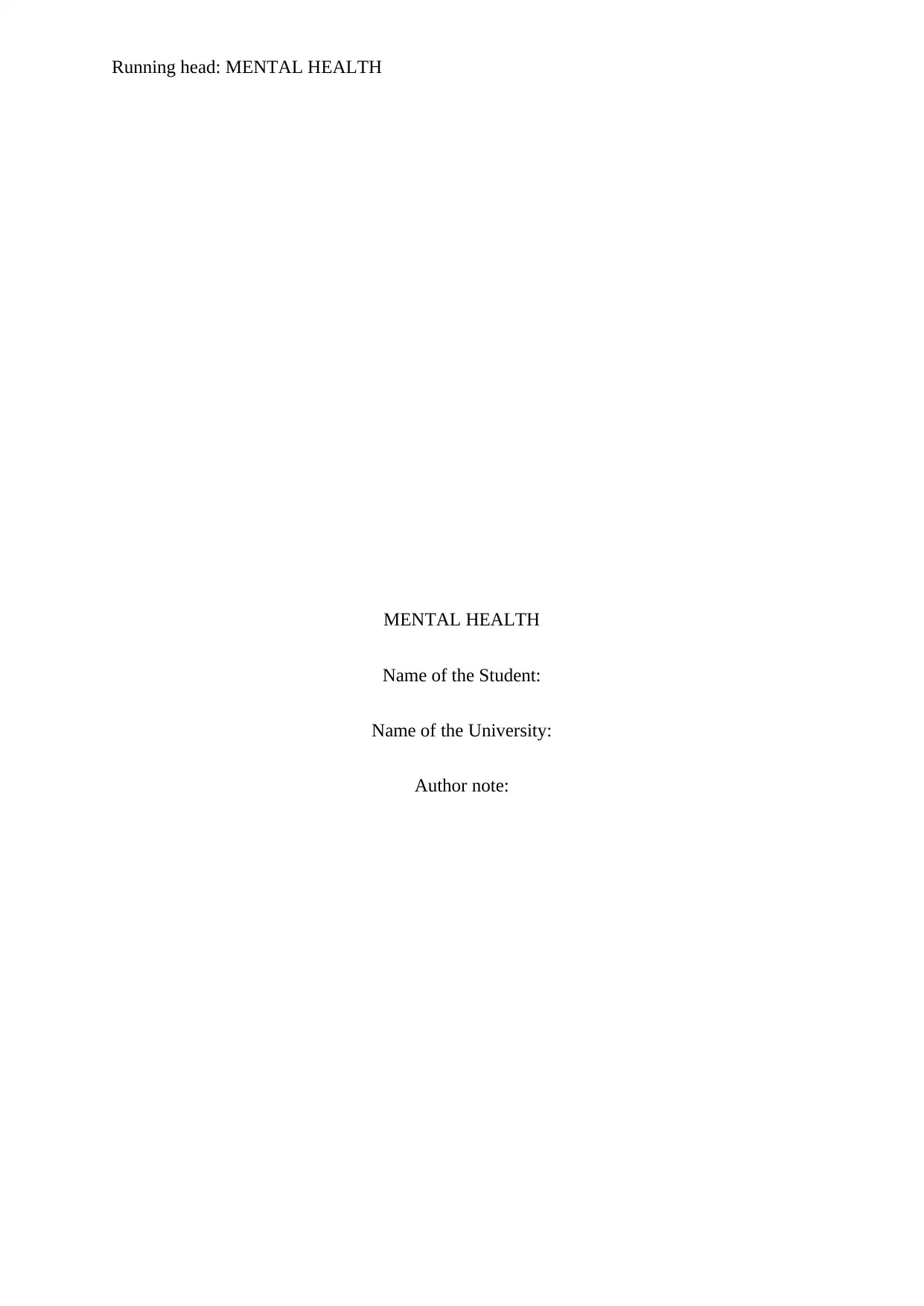
Running head: MENTAL HEALTH
MENTAL HEALTH
Name of the Student:
Name of the University:
Author note:
MENTAL HEALTH
Name of the Student:
Name of the University:
Author note:
Paraphrase This Document
Need a fresh take? Get an instant paraphrase of this document with our AI Paraphraser
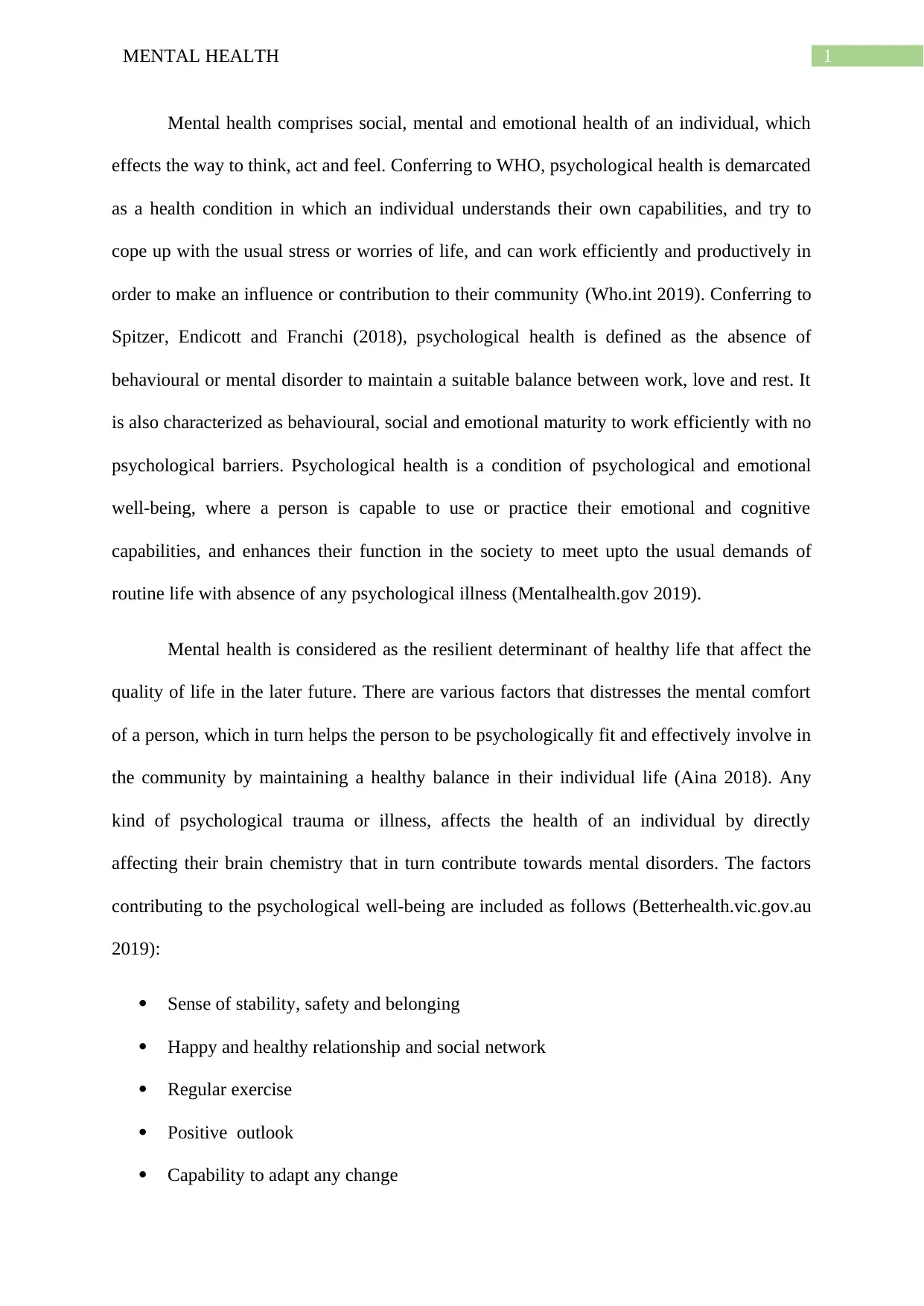
1MENTAL HEALTH
Mental health comprises social, mental and emotional health of an individual, which
effects the way to think, act and feel. Conferring to WHO, psychological health is demarcated
as a health condition in which an individual understands their own capabilities, and try to
cope up with the usual stress or worries of life, and can work efficiently and productively in
order to make an influence or contribution to their community (Who.int 2019). Conferring to
Spitzer, Endicott and Franchi (2018), psychological health is defined as the absence of
behavioural or mental disorder to maintain a suitable balance between work, love and rest. It
is also characterized as behavioural, social and emotional maturity to work efficiently with no
psychological barriers. Psychological health is a condition of psychological and emotional
well-being, where a person is capable to use or practice their emotional and cognitive
capabilities, and enhances their function in the society to meet upto the usual demands of
routine life with absence of any psychological illness (Mentalhealth.gov 2019).
Mental health is considered as the resilient determinant of healthy life that affect the
quality of life in the later future. There are various factors that distresses the mental comfort
of a person, which in turn helps the person to be psychologically fit and effectively involve in
the community by maintaining a healthy balance in their individual life (Aina 2018). Any
kind of psychological trauma or illness, affects the health of an individual by directly
affecting their brain chemistry that in turn contribute towards mental disorders. The factors
contributing to the psychological well-being are included as follows (Betterhealth.vic.gov.au
2019):
Sense of stability, safety and belonging
Happy and healthy relationship and social network
Regular exercise
Positive outlook
Capability to adapt any change
Mental health comprises social, mental and emotional health of an individual, which
effects the way to think, act and feel. Conferring to WHO, psychological health is demarcated
as a health condition in which an individual understands their own capabilities, and try to
cope up with the usual stress or worries of life, and can work efficiently and productively in
order to make an influence or contribution to their community (Who.int 2019). Conferring to
Spitzer, Endicott and Franchi (2018), psychological health is defined as the absence of
behavioural or mental disorder to maintain a suitable balance between work, love and rest. It
is also characterized as behavioural, social and emotional maturity to work efficiently with no
psychological barriers. Psychological health is a condition of psychological and emotional
well-being, where a person is capable to use or practice their emotional and cognitive
capabilities, and enhances their function in the society to meet upto the usual demands of
routine life with absence of any psychological illness (Mentalhealth.gov 2019).
Mental health is considered as the resilient determinant of healthy life that affect the
quality of life in the later future. There are various factors that distresses the mental comfort
of a person, which in turn helps the person to be psychologically fit and effectively involve in
the community by maintaining a healthy balance in their individual life (Aina 2018). Any
kind of psychological trauma or illness, affects the health of an individual by directly
affecting their brain chemistry that in turn contribute towards mental disorders. The factors
contributing to the psychological well-being are included as follows (Betterhealth.vic.gov.au
2019):
Sense of stability, safety and belonging
Happy and healthy relationship and social network
Regular exercise
Positive outlook
Capability to adapt any change
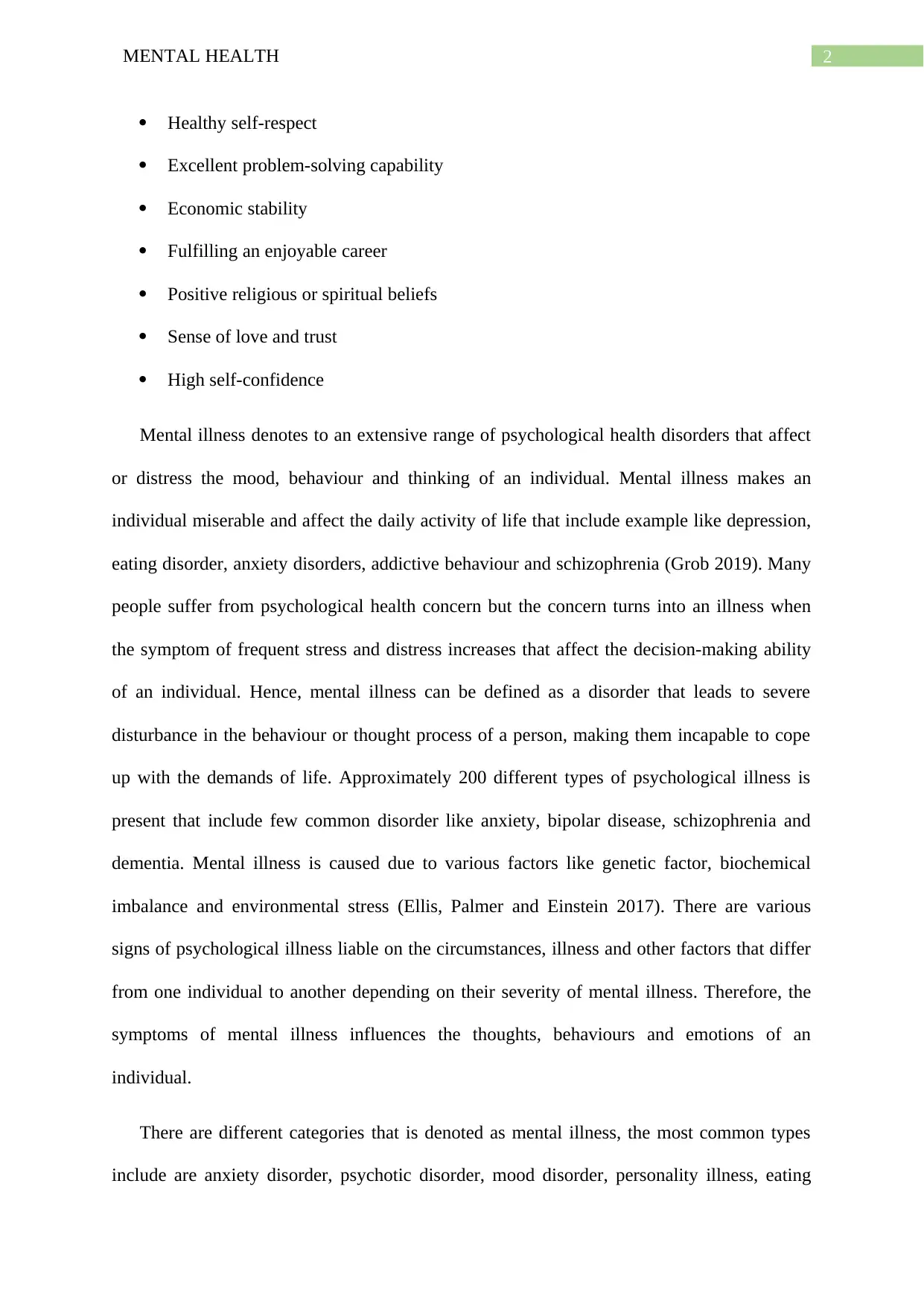
2MENTAL HEALTH
Healthy self-respect
Excellent problem-solving capability
Economic stability
Fulfilling an enjoyable career
Positive religious or spiritual beliefs
Sense of love and trust
High self-confidence
Mental illness denotes to an extensive range of psychological health disorders that affect
or distress the mood, behaviour and thinking of an individual. Mental illness makes an
individual miserable and affect the daily activity of life that include example like depression,
eating disorder, anxiety disorders, addictive behaviour and schizophrenia (Grob 2019). Many
people suffer from psychological health concern but the concern turns into an illness when
the symptom of frequent stress and distress increases that affect the decision-making ability
of an individual. Hence, mental illness can be defined as a disorder that leads to severe
disturbance in the behaviour or thought process of a person, making them incapable to cope
up with the demands of life. Approximately 200 different types of psychological illness is
present that include few common disorder like anxiety, bipolar disease, schizophrenia and
dementia. Mental illness is caused due to various factors like genetic factor, biochemical
imbalance and environmental stress (Ellis, Palmer and Einstein 2017). There are various
signs of psychological illness liable on the circumstances, illness and other factors that differ
from one individual to another depending on their severity of mental illness. Therefore, the
symptoms of mental illness influences the thoughts, behaviours and emotions of an
individual.
There are different categories that is denoted as mental illness, the most common types
include are anxiety disorder, psychotic disorder, mood disorder, personality illness, eating
Healthy self-respect
Excellent problem-solving capability
Economic stability
Fulfilling an enjoyable career
Positive religious or spiritual beliefs
Sense of love and trust
High self-confidence
Mental illness denotes to an extensive range of psychological health disorders that affect
or distress the mood, behaviour and thinking of an individual. Mental illness makes an
individual miserable and affect the daily activity of life that include example like depression,
eating disorder, anxiety disorders, addictive behaviour and schizophrenia (Grob 2019). Many
people suffer from psychological health concern but the concern turns into an illness when
the symptom of frequent stress and distress increases that affect the decision-making ability
of an individual. Hence, mental illness can be defined as a disorder that leads to severe
disturbance in the behaviour or thought process of a person, making them incapable to cope
up with the demands of life. Approximately 200 different types of psychological illness is
present that include few common disorder like anxiety, bipolar disease, schizophrenia and
dementia. Mental illness is caused due to various factors like genetic factor, biochemical
imbalance and environmental stress (Ellis, Palmer and Einstein 2017). There are various
signs of psychological illness liable on the circumstances, illness and other factors that differ
from one individual to another depending on their severity of mental illness. Therefore, the
symptoms of mental illness influences the thoughts, behaviours and emotions of an
individual.
There are different categories that is denoted as mental illness, the most common types
include are anxiety disorder, psychotic disorder, mood disorder, personality illness, eating
⊘ This is a preview!⊘
Do you want full access?
Subscribe today to unlock all pages.

Trusted by 1+ million students worldwide
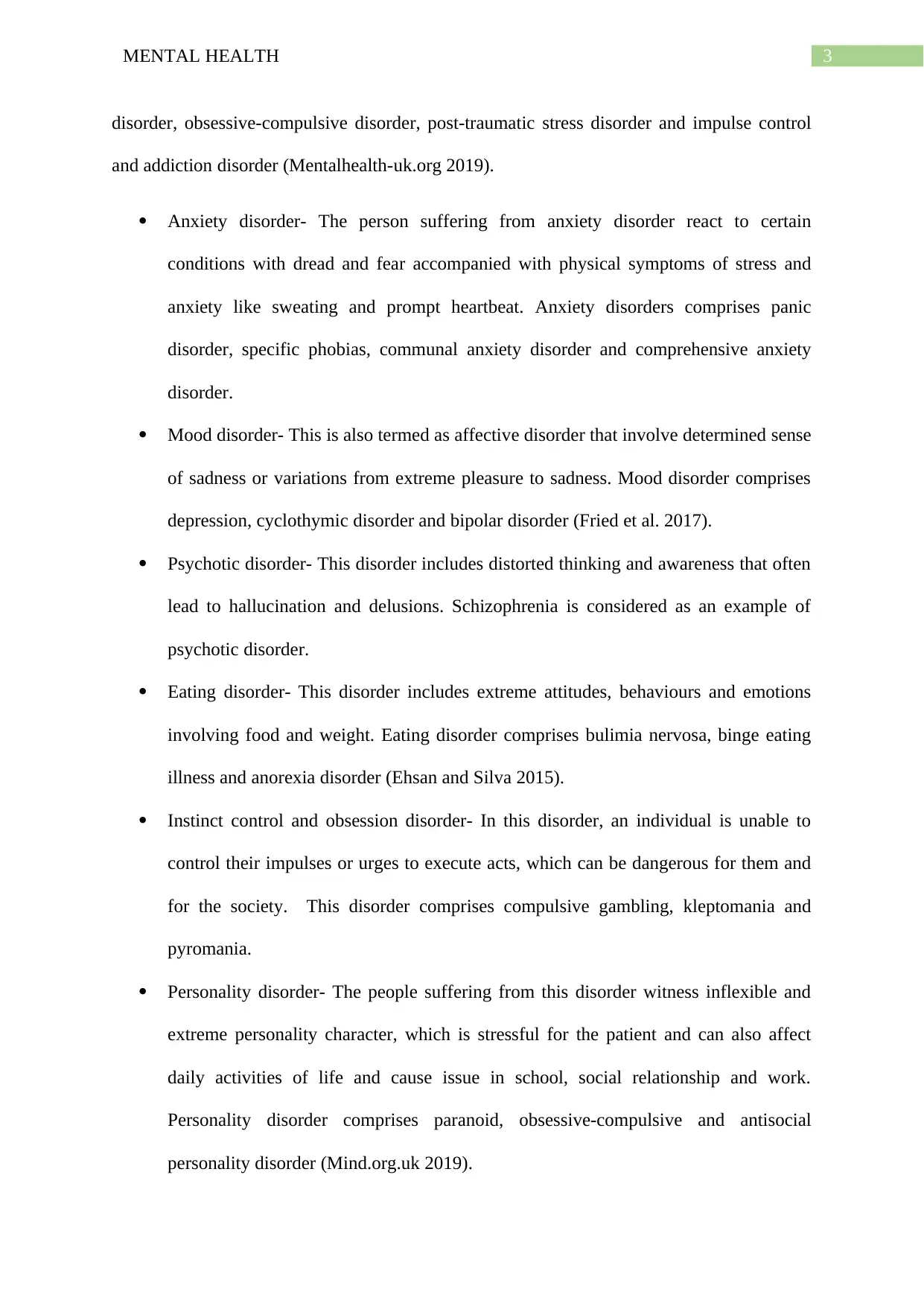
3MENTAL HEALTH
disorder, obsessive-compulsive disorder, post-traumatic stress disorder and impulse control
and addiction disorder (Mentalhealth-uk.org 2019).
Anxiety disorder- The person suffering from anxiety disorder react to certain
conditions with dread and fear accompanied with physical symptoms of stress and
anxiety like sweating and prompt heartbeat. Anxiety disorders comprises panic
disorder, specific phobias, communal anxiety disorder and comprehensive anxiety
disorder.
Mood disorder- This is also termed as affective disorder that involve determined sense
of sadness or variations from extreme pleasure to sadness. Mood disorder comprises
depression, cyclothymic disorder and bipolar disorder (Fried et al. 2017).
Psychotic disorder- This disorder includes distorted thinking and awareness that often
lead to hallucination and delusions. Schizophrenia is considered as an example of
psychotic disorder.
Eating disorder- This disorder includes extreme attitudes, behaviours and emotions
involving food and weight. Eating disorder comprises bulimia nervosa, binge eating
illness and anorexia disorder (Ehsan and Silva 2015).
Instinct control and obsession disorder- In this disorder, an individual is unable to
control their impulses or urges to execute acts, which can be dangerous for them and
for the society. This disorder comprises compulsive gambling, kleptomania and
pyromania.
Personality disorder- The people suffering from this disorder witness inflexible and
extreme personality character, which is stressful for the patient and can also affect
daily activities of life and cause issue in school, social relationship and work.
Personality disorder comprises paranoid, obsessive-compulsive and antisocial
personality disorder (Mind.org.uk 2019).
disorder, obsessive-compulsive disorder, post-traumatic stress disorder and impulse control
and addiction disorder (Mentalhealth-uk.org 2019).
Anxiety disorder- The person suffering from anxiety disorder react to certain
conditions with dread and fear accompanied with physical symptoms of stress and
anxiety like sweating and prompt heartbeat. Anxiety disorders comprises panic
disorder, specific phobias, communal anxiety disorder and comprehensive anxiety
disorder.
Mood disorder- This is also termed as affective disorder that involve determined sense
of sadness or variations from extreme pleasure to sadness. Mood disorder comprises
depression, cyclothymic disorder and bipolar disorder (Fried et al. 2017).
Psychotic disorder- This disorder includes distorted thinking and awareness that often
lead to hallucination and delusions. Schizophrenia is considered as an example of
psychotic disorder.
Eating disorder- This disorder includes extreme attitudes, behaviours and emotions
involving food and weight. Eating disorder comprises bulimia nervosa, binge eating
illness and anorexia disorder (Ehsan and Silva 2015).
Instinct control and obsession disorder- In this disorder, an individual is unable to
control their impulses or urges to execute acts, which can be dangerous for them and
for the society. This disorder comprises compulsive gambling, kleptomania and
pyromania.
Personality disorder- The people suffering from this disorder witness inflexible and
extreme personality character, which is stressful for the patient and can also affect
daily activities of life and cause issue in school, social relationship and work.
Personality disorder comprises paranoid, obsessive-compulsive and antisocial
personality disorder (Mind.org.uk 2019).
Paraphrase This Document
Need a fresh take? Get an instant paraphrase of this document with our AI Paraphraser
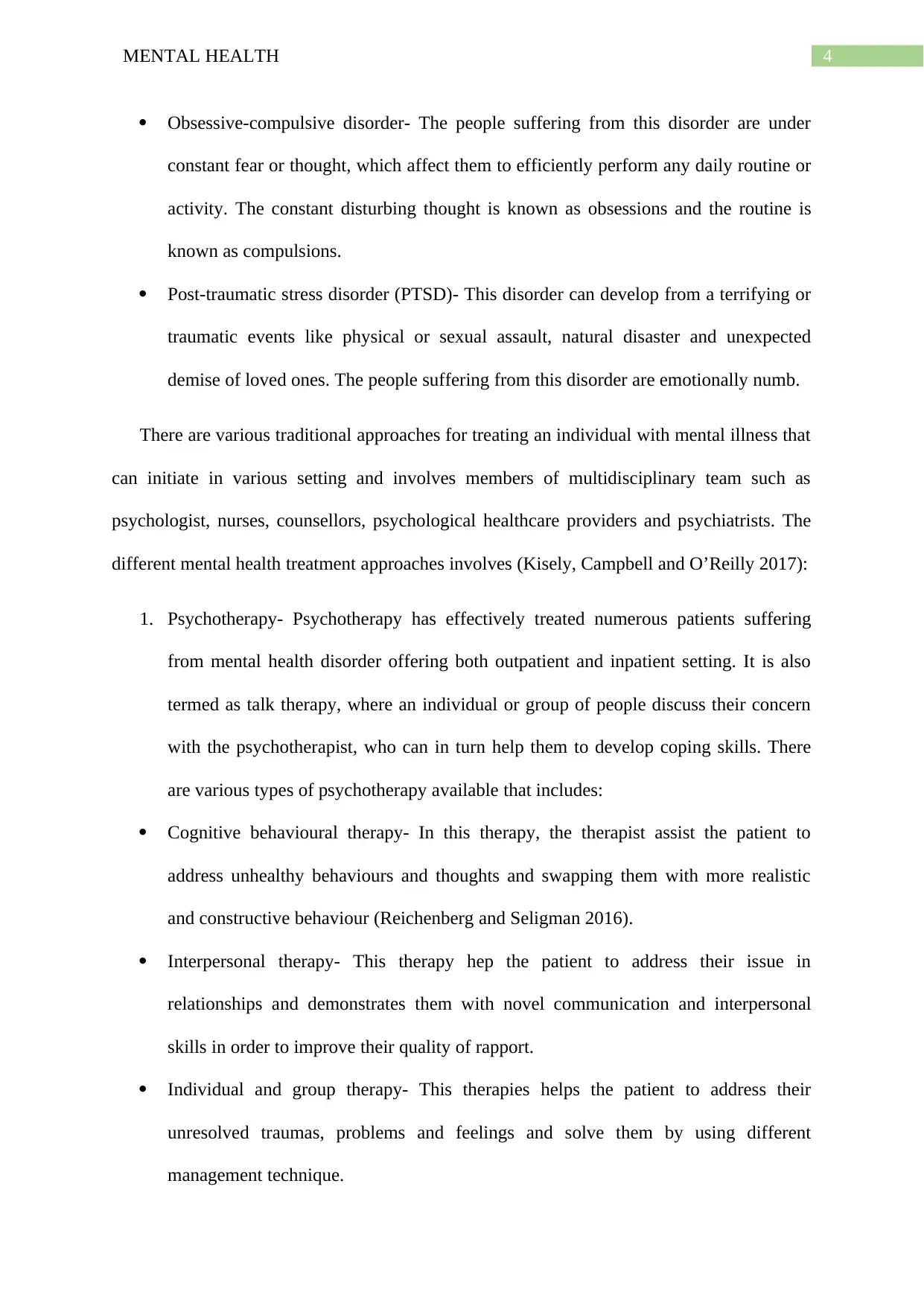
4MENTAL HEALTH
Obsessive-compulsive disorder- The people suffering from this disorder are under
constant fear or thought, which affect them to efficiently perform any daily routine or
activity. The constant disturbing thought is known as obsessions and the routine is
known as compulsions.
Post-traumatic stress disorder (PTSD)- This disorder can develop from a terrifying or
traumatic events like physical or sexual assault, natural disaster and unexpected
demise of loved ones. The people suffering from this disorder are emotionally numb.
There are various traditional approaches for treating an individual with mental illness that
can initiate in various setting and involves members of multidisciplinary team such as
psychologist, nurses, counsellors, psychological healthcare providers and psychiatrists. The
different mental health treatment approaches involves (Kisely, Campbell and O’Reilly 2017):
1. Psychotherapy- Psychotherapy has effectively treated numerous patients suffering
from mental health disorder offering both outpatient and inpatient setting. It is also
termed as talk therapy, where an individual or group of people discuss their concern
with the psychotherapist, who can in turn help them to develop coping skills. There
are various types of psychotherapy available that includes:
Cognitive behavioural therapy- In this therapy, the therapist assist the patient to
address unhealthy behaviours and thoughts and swapping them with more realistic
and constructive behaviour (Reichenberg and Seligman 2016).
Interpersonal therapy- This therapy hep the patient to address their issue in
relationships and demonstrates them with novel communication and interpersonal
skills in order to improve their quality of rapport.
Individual and group therapy- This therapies helps the patient to address their
unresolved traumas, problems and feelings and solve them by using different
management technique.
Obsessive-compulsive disorder- The people suffering from this disorder are under
constant fear or thought, which affect them to efficiently perform any daily routine or
activity. The constant disturbing thought is known as obsessions and the routine is
known as compulsions.
Post-traumatic stress disorder (PTSD)- This disorder can develop from a terrifying or
traumatic events like physical or sexual assault, natural disaster and unexpected
demise of loved ones. The people suffering from this disorder are emotionally numb.
There are various traditional approaches for treating an individual with mental illness that
can initiate in various setting and involves members of multidisciplinary team such as
psychologist, nurses, counsellors, psychological healthcare providers and psychiatrists. The
different mental health treatment approaches involves (Kisely, Campbell and O’Reilly 2017):
1. Psychotherapy- Psychotherapy has effectively treated numerous patients suffering
from mental health disorder offering both outpatient and inpatient setting. It is also
termed as talk therapy, where an individual or group of people discuss their concern
with the psychotherapist, who can in turn help them to develop coping skills. There
are various types of psychotherapy available that includes:
Cognitive behavioural therapy- In this therapy, the therapist assist the patient to
address unhealthy behaviours and thoughts and swapping them with more realistic
and constructive behaviour (Reichenberg and Seligman 2016).
Interpersonal therapy- This therapy hep the patient to address their issue in
relationships and demonstrates them with novel communication and interpersonal
skills in order to improve their quality of rapport.
Individual and group therapy- This therapies helps the patient to address their
unresolved traumas, problems and feelings and solve them by using different
management technique.
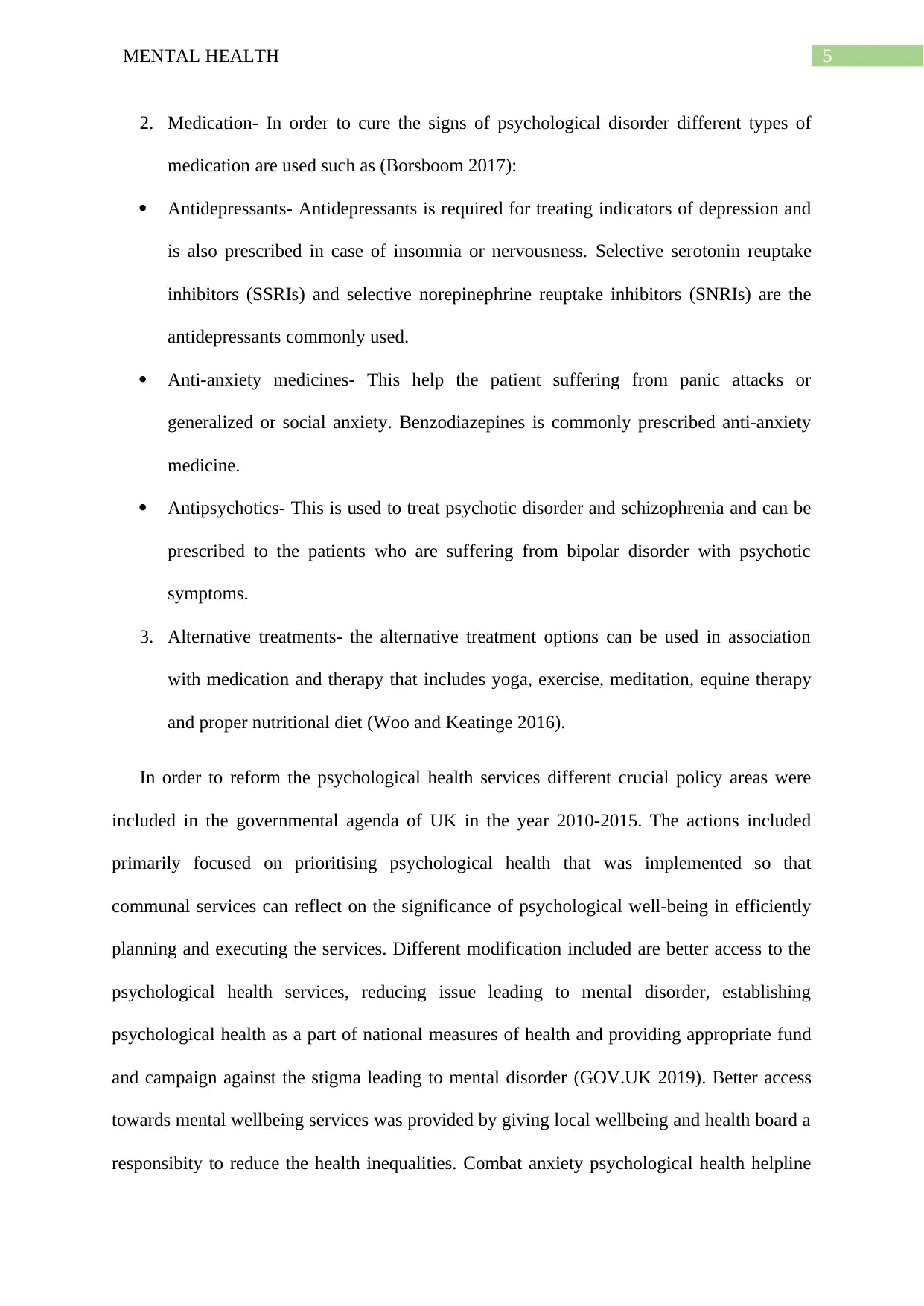
5MENTAL HEALTH
2. Medication- In order to cure the signs of psychological disorder different types of
medication are used such as (Borsboom 2017):
Antidepressants- Antidepressants is required for treating indicators of depression and
is also prescribed in case of insomnia or nervousness. Selective serotonin reuptake
inhibitors (SSRIs) and selective norepinephrine reuptake inhibitors (SNRIs) are the
antidepressants commonly used.
Anti-anxiety medicines- This help the patient suffering from panic attacks or
generalized or social anxiety. Benzodiazepines is commonly prescribed anti-anxiety
medicine.
Antipsychotics- This is used to treat psychotic disorder and schizophrenia and can be
prescribed to the patients who are suffering from bipolar disorder with psychotic
symptoms.
3. Alternative treatments- the alternative treatment options can be used in association
with medication and therapy that includes yoga, exercise, meditation, equine therapy
and proper nutritional diet (Woo and Keatinge 2016).
In order to reform the psychological health services different crucial policy areas were
included in the governmental agenda of UK in the year 2010-2015. The actions included
primarily focused on prioritising psychological health that was implemented so that
communal services can reflect on the significance of psychological well-being in efficiently
planning and executing the services. Different modification included are better access to the
psychological health services, reducing issue leading to mental disorder, establishing
psychological health as a part of national measures of health and providing appropriate fund
and campaign against the stigma leading to mental disorder (GOV.UK 2019). Better access
towards mental wellbeing services was provided by giving local wellbeing and health board a
responsibity to reduce the health inequalities. Combat anxiety psychological health helpline
2. Medication- In order to cure the signs of psychological disorder different types of
medication are used such as (Borsboom 2017):
Antidepressants- Antidepressants is required for treating indicators of depression and
is also prescribed in case of insomnia or nervousness. Selective serotonin reuptake
inhibitors (SSRIs) and selective norepinephrine reuptake inhibitors (SNRIs) are the
antidepressants commonly used.
Anti-anxiety medicines- This help the patient suffering from panic attacks or
generalized or social anxiety. Benzodiazepines is commonly prescribed anti-anxiety
medicine.
Antipsychotics- This is used to treat psychotic disorder and schizophrenia and can be
prescribed to the patients who are suffering from bipolar disorder with psychotic
symptoms.
3. Alternative treatments- the alternative treatment options can be used in association
with medication and therapy that includes yoga, exercise, meditation, equine therapy
and proper nutritional diet (Woo and Keatinge 2016).
In order to reform the psychological health services different crucial policy areas were
included in the governmental agenda of UK in the year 2010-2015. The actions included
primarily focused on prioritising psychological health that was implemented so that
communal services can reflect on the significance of psychological well-being in efficiently
planning and executing the services. Different modification included are better access to the
psychological health services, reducing issue leading to mental disorder, establishing
psychological health as a part of national measures of health and providing appropriate fund
and campaign against the stigma leading to mental disorder (GOV.UK 2019). Better access
towards mental wellbeing services was provided by giving local wellbeing and health board a
responsibity to reduce the health inequalities. Combat anxiety psychological health helpline
⊘ This is a preview!⊘
Do you want full access?
Subscribe today to unlock all pages.

Trusted by 1+ million students worldwide
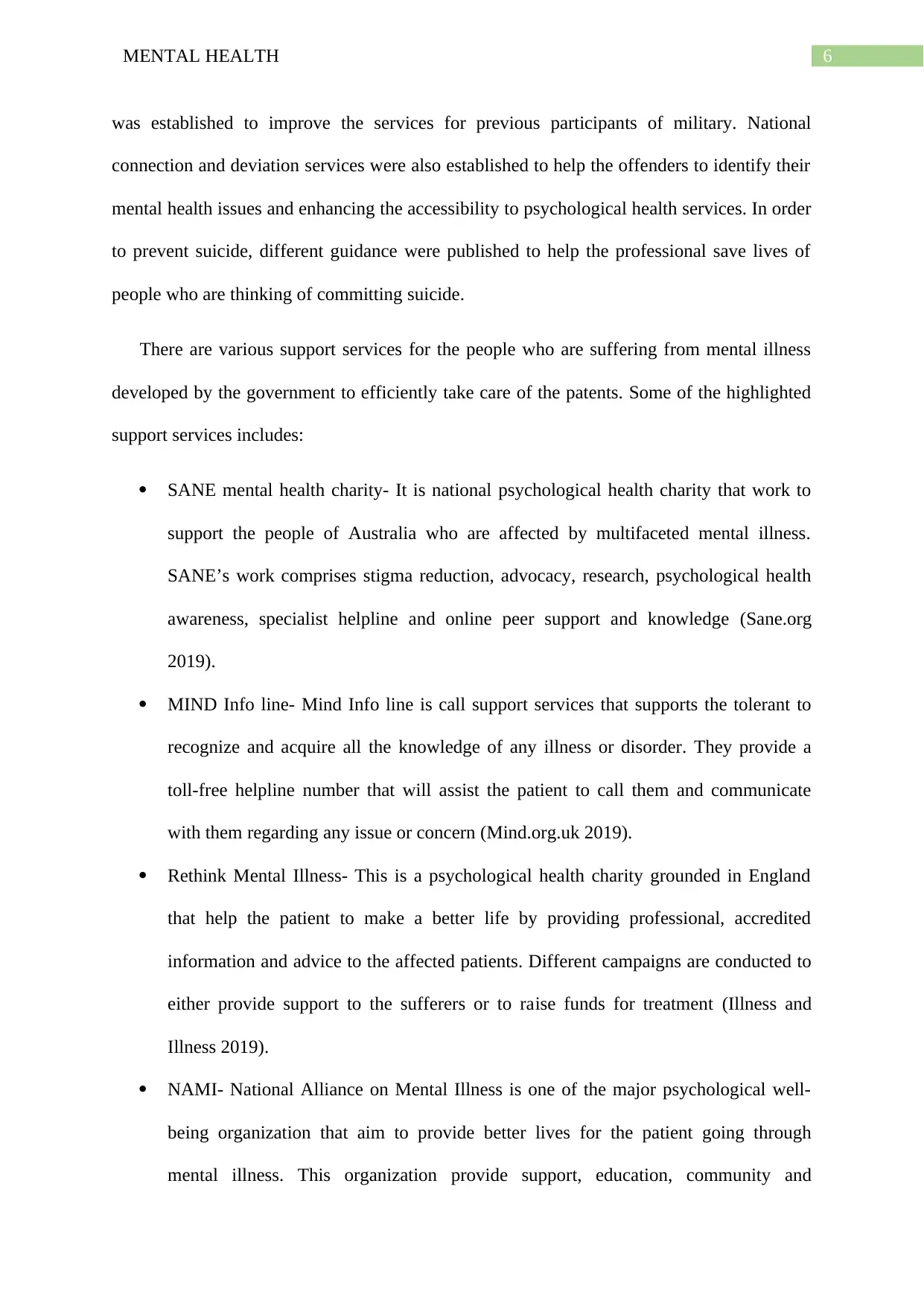
6MENTAL HEALTH
was established to improve the services for previous participants of military. National
connection and deviation services were also established to help the offenders to identify their
mental health issues and enhancing the accessibility to psychological health services. In order
to prevent suicide, different guidance were published to help the professional save lives of
people who are thinking of committing suicide.
There are various support services for the people who are suffering from mental illness
developed by the government to efficiently take care of the patents. Some of the highlighted
support services includes:
SANE mental health charity- It is national psychological health charity that work to
support the people of Australia who are affected by multifaceted mental illness.
SANE’s work comprises stigma reduction, advocacy, research, psychological health
awareness, specialist helpline and online peer support and knowledge (Sane.org
2019).
MIND Info line- Mind Info line is call support services that supports the tolerant to
recognize and acquire all the knowledge of any illness or disorder. They provide a
toll-free helpline number that will assist the patient to call them and communicate
with them regarding any issue or concern (Mind.org.uk 2019).
Rethink Mental Illness- This is a psychological health charity grounded in England
that help the patient to make a better life by providing professional, accredited
information and advice to the affected patients. Different campaigns are conducted to
either provide support to the sufferers or to raise funds for treatment (Illness and
Illness 2019).
NAMI- National Alliance on Mental Illness is one of the major psychological well-
being organization that aim to provide better lives for the patient going through
mental illness. This organization provide support, education, community and
was established to improve the services for previous participants of military. National
connection and deviation services were also established to help the offenders to identify their
mental health issues and enhancing the accessibility to psychological health services. In order
to prevent suicide, different guidance were published to help the professional save lives of
people who are thinking of committing suicide.
There are various support services for the people who are suffering from mental illness
developed by the government to efficiently take care of the patents. Some of the highlighted
support services includes:
SANE mental health charity- It is national psychological health charity that work to
support the people of Australia who are affected by multifaceted mental illness.
SANE’s work comprises stigma reduction, advocacy, research, psychological health
awareness, specialist helpline and online peer support and knowledge (Sane.org
2019).
MIND Info line- Mind Info line is call support services that supports the tolerant to
recognize and acquire all the knowledge of any illness or disorder. They provide a
toll-free helpline number that will assist the patient to call them and communicate
with them regarding any issue or concern (Mind.org.uk 2019).
Rethink Mental Illness- This is a psychological health charity grounded in England
that help the patient to make a better life by providing professional, accredited
information and advice to the affected patients. Different campaigns are conducted to
either provide support to the sufferers or to raise funds for treatment (Illness and
Illness 2019).
NAMI- National Alliance on Mental Illness is one of the major psychological well-
being organization that aim to provide better lives for the patient going through
mental illness. This organization provide support, education, community and
Paraphrase This Document
Need a fresh take? Get an instant paraphrase of this document with our AI Paraphraser
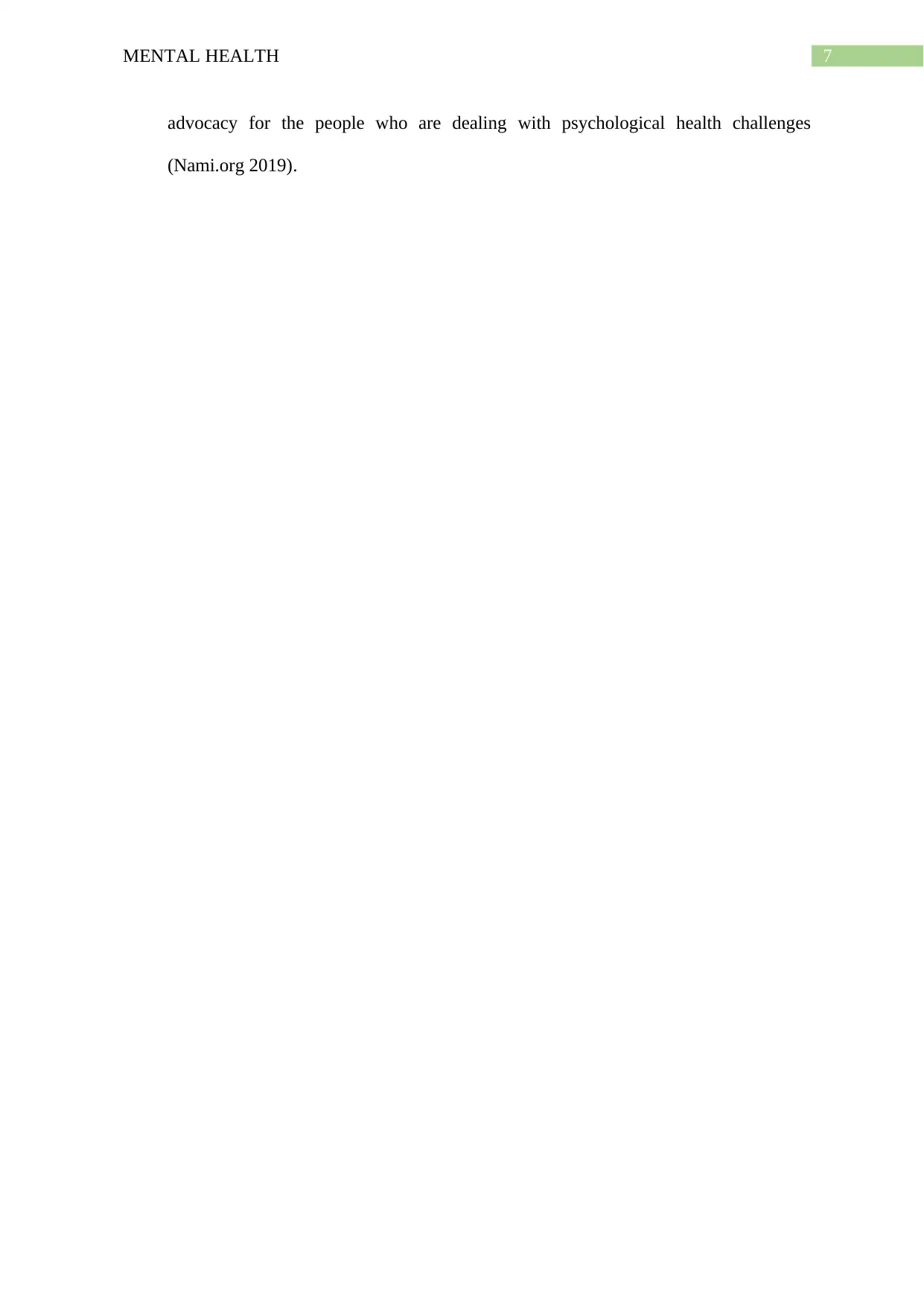
7MENTAL HEALTH
advocacy for the people who are dealing with psychological health challenges
(Nami.org 2019).
advocacy for the people who are dealing with psychological health challenges
(Nami.org 2019).
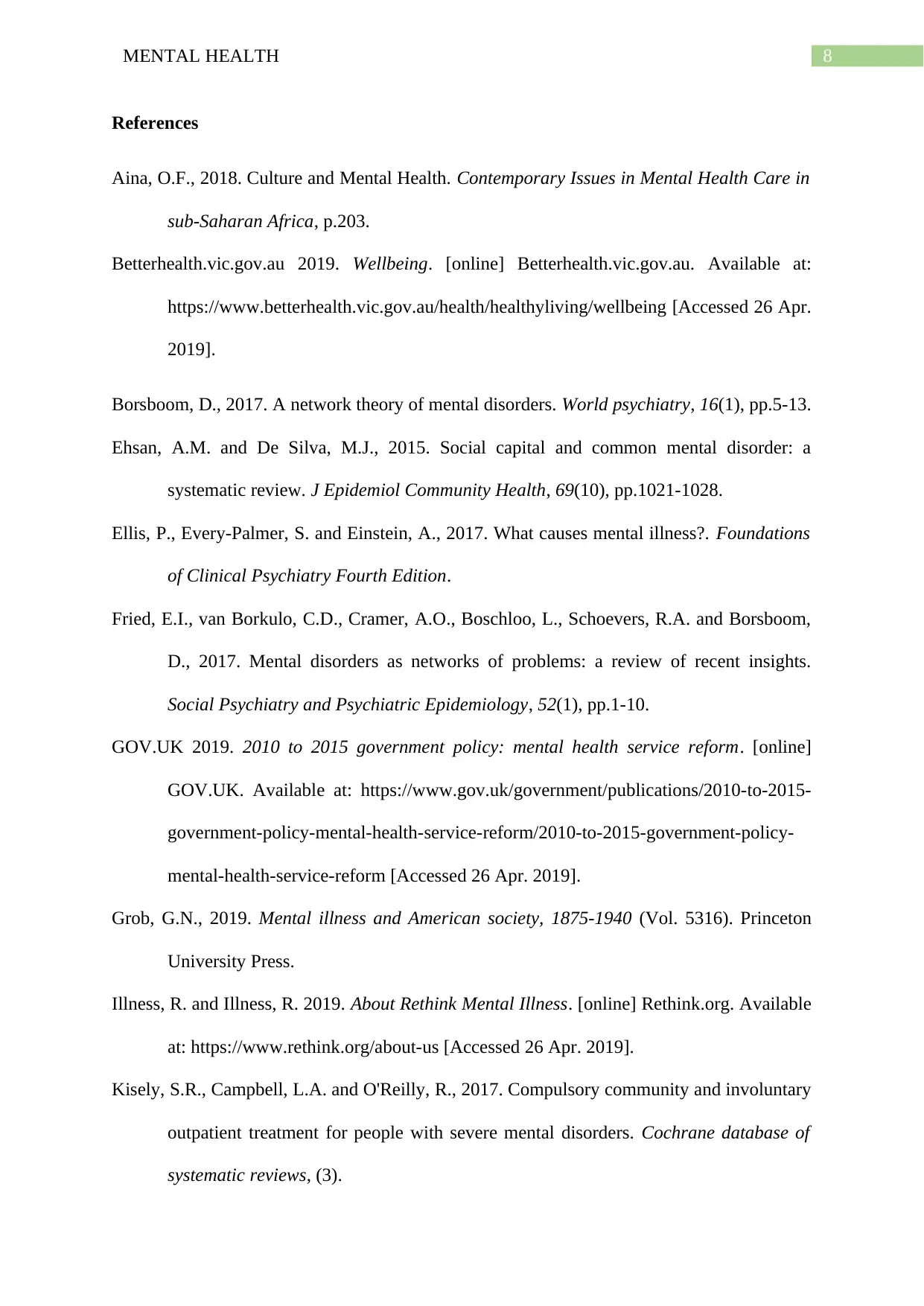
8MENTAL HEALTH
References
Aina, O.F., 2018. Culture and Mental Health. Contemporary Issues in Mental Health Care in
sub-Saharan Africa, p.203.
Betterhealth.vic.gov.au 2019. Wellbeing. [online] Betterhealth.vic.gov.au. Available at:
https://www.betterhealth.vic.gov.au/health/healthyliving/wellbeing [Accessed 26 Apr.
2019].
Borsboom, D., 2017. A network theory of mental disorders. World psychiatry, 16(1), pp.5-13.
Ehsan, A.M. and De Silva, M.J., 2015. Social capital and common mental disorder: a
systematic review. J Epidemiol Community Health, 69(10), pp.1021-1028.
Ellis, P., Every-Palmer, S. and Einstein, A., 2017. What causes mental illness?. Foundations
of Clinical Psychiatry Fourth Edition.
Fried, E.I., van Borkulo, C.D., Cramer, A.O., Boschloo, L., Schoevers, R.A. and Borsboom,
D., 2017. Mental disorders as networks of problems: a review of recent insights.
Social Psychiatry and Psychiatric Epidemiology, 52(1), pp.1-10.
GOV.UK 2019. 2010 to 2015 government policy: mental health service reform. [online]
GOV.UK. Available at: https://www.gov.uk/government/publications/2010-to-2015-
government-policy-mental-health-service-reform/2010-to-2015-government-policy-
mental-health-service-reform [Accessed 26 Apr. 2019].
Grob, G.N., 2019. Mental illness and American society, 1875-1940 (Vol. 5316). Princeton
University Press.
Illness, R. and Illness, R. 2019. About Rethink Mental Illness. [online] Rethink.org. Available
at: https://www.rethink.org/about-us [Accessed 26 Apr. 2019].
Kisely, S.R., Campbell, L.A. and O'Reilly, R., 2017. Compulsory community and involuntary
outpatient treatment for people with severe mental disorders. Cochrane database of
systematic reviews, (3).
References
Aina, O.F., 2018. Culture and Mental Health. Contemporary Issues in Mental Health Care in
sub-Saharan Africa, p.203.
Betterhealth.vic.gov.au 2019. Wellbeing. [online] Betterhealth.vic.gov.au. Available at:
https://www.betterhealth.vic.gov.au/health/healthyliving/wellbeing [Accessed 26 Apr.
2019].
Borsboom, D., 2017. A network theory of mental disorders. World psychiatry, 16(1), pp.5-13.
Ehsan, A.M. and De Silva, M.J., 2015. Social capital and common mental disorder: a
systematic review. J Epidemiol Community Health, 69(10), pp.1021-1028.
Ellis, P., Every-Palmer, S. and Einstein, A., 2017. What causes mental illness?. Foundations
of Clinical Psychiatry Fourth Edition.
Fried, E.I., van Borkulo, C.D., Cramer, A.O., Boschloo, L., Schoevers, R.A. and Borsboom,
D., 2017. Mental disorders as networks of problems: a review of recent insights.
Social Psychiatry and Psychiatric Epidemiology, 52(1), pp.1-10.
GOV.UK 2019. 2010 to 2015 government policy: mental health service reform. [online]
GOV.UK. Available at: https://www.gov.uk/government/publications/2010-to-2015-
government-policy-mental-health-service-reform/2010-to-2015-government-policy-
mental-health-service-reform [Accessed 26 Apr. 2019].
Grob, G.N., 2019. Mental illness and American society, 1875-1940 (Vol. 5316). Princeton
University Press.
Illness, R. and Illness, R. 2019. About Rethink Mental Illness. [online] Rethink.org. Available
at: https://www.rethink.org/about-us [Accessed 26 Apr. 2019].
Kisely, S.R., Campbell, L.A. and O'Reilly, R., 2017. Compulsory community and involuntary
outpatient treatment for people with severe mental disorders. Cochrane database of
systematic reviews, (3).
⊘ This is a preview!⊘
Do you want full access?
Subscribe today to unlock all pages.

Trusted by 1+ million students worldwide
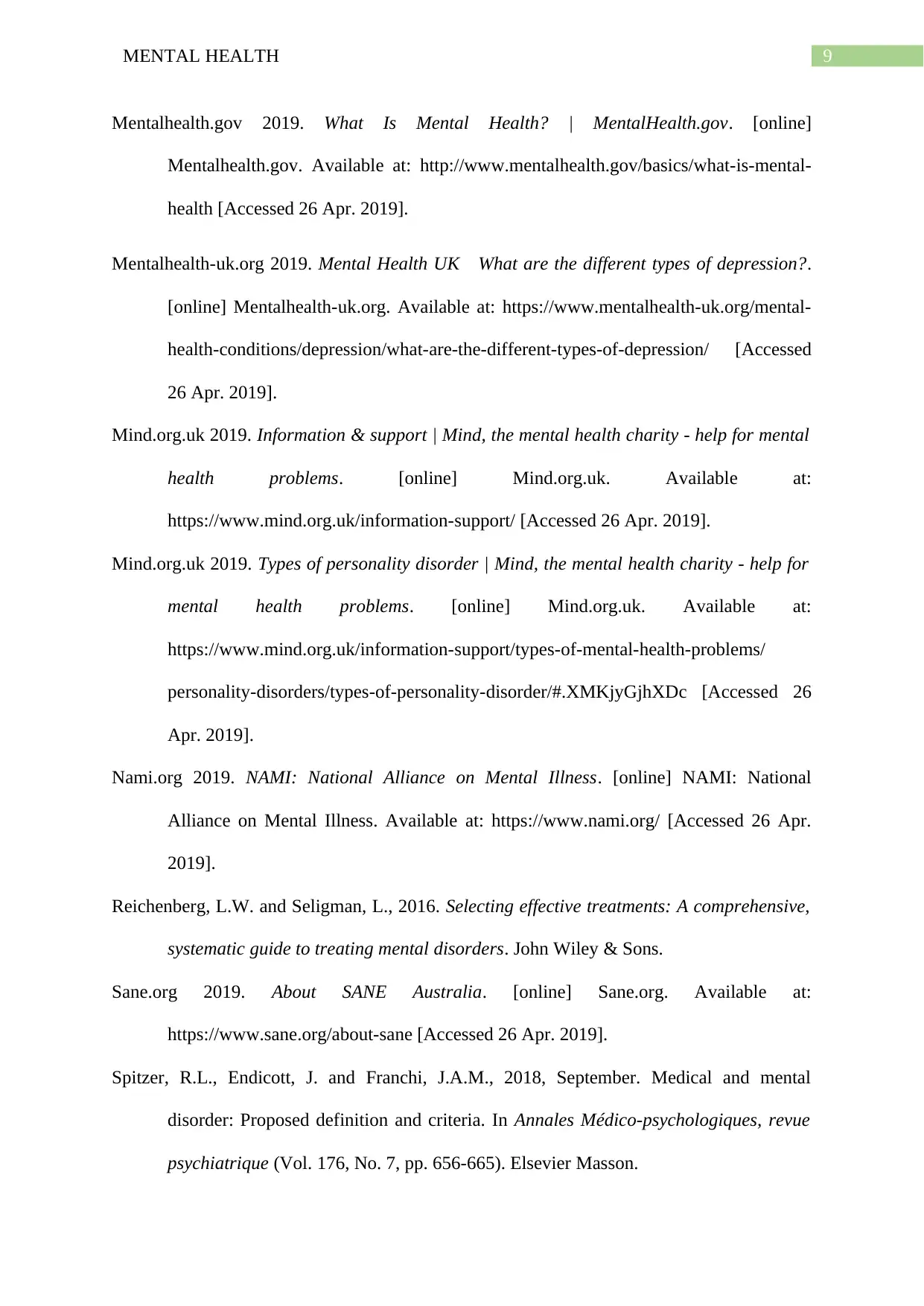
9MENTAL HEALTH
Mentalhealth.gov 2019. What Is Mental Health? | MentalHealth.gov. [online]
Mentalhealth.gov. Available at: http://www.mentalhealth.gov/basics/what-is-mental-
health [Accessed 26 Apr. 2019].
Mentalhealth-uk.org 2019. Mental Health UK What are the different types of depression?.
[online] Mentalhealth-uk.org. Available at: https://www.mentalhealth-uk.org/mental-
health-conditions/depression/what-are-the-different-types-of-depression/ [Accessed
26 Apr. 2019].
Mind.org.uk 2019. Information & support | Mind, the mental health charity - help for mental
health problems. [online] Mind.org.uk. Available at:
https://www.mind.org.uk/information-support/ [Accessed 26 Apr. 2019].
Mind.org.uk 2019. Types of personality disorder | Mind, the mental health charity - help for
mental health problems. [online] Mind.org.uk. Available at:
https://www.mind.org.uk/information-support/types-of-mental-health-problems/
personality-disorders/types-of-personality-disorder/#.XMKjyGjhXDc [Accessed 26
Apr. 2019].
Nami.org 2019. NAMI: National Alliance on Mental Illness. [online] NAMI: National
Alliance on Mental Illness. Available at: https://www.nami.org/ [Accessed 26 Apr.
2019].
Reichenberg, L.W. and Seligman, L., 2016. Selecting effective treatments: A comprehensive,
systematic guide to treating mental disorders. John Wiley & Sons.
Sane.org 2019. About SANE Australia. [online] Sane.org. Available at:
https://www.sane.org/about-sane [Accessed 26 Apr. 2019].
Spitzer, R.L., Endicott, J. and Franchi, J.A.M., 2018, September. Medical and mental
disorder: Proposed definition and criteria. In Annales Médico-psychologiques, revue
psychiatrique (Vol. 176, No. 7, pp. 656-665). Elsevier Masson.
Mentalhealth.gov 2019. What Is Mental Health? | MentalHealth.gov. [online]
Mentalhealth.gov. Available at: http://www.mentalhealth.gov/basics/what-is-mental-
health [Accessed 26 Apr. 2019].
Mentalhealth-uk.org 2019. Mental Health UK What are the different types of depression?.
[online] Mentalhealth-uk.org. Available at: https://www.mentalhealth-uk.org/mental-
health-conditions/depression/what-are-the-different-types-of-depression/ [Accessed
26 Apr. 2019].
Mind.org.uk 2019. Information & support | Mind, the mental health charity - help for mental
health problems. [online] Mind.org.uk. Available at:
https://www.mind.org.uk/information-support/ [Accessed 26 Apr. 2019].
Mind.org.uk 2019. Types of personality disorder | Mind, the mental health charity - help for
mental health problems. [online] Mind.org.uk. Available at:
https://www.mind.org.uk/information-support/types-of-mental-health-problems/
personality-disorders/types-of-personality-disorder/#.XMKjyGjhXDc [Accessed 26
Apr. 2019].
Nami.org 2019. NAMI: National Alliance on Mental Illness. [online] NAMI: National
Alliance on Mental Illness. Available at: https://www.nami.org/ [Accessed 26 Apr.
2019].
Reichenberg, L.W. and Seligman, L., 2016. Selecting effective treatments: A comprehensive,
systematic guide to treating mental disorders. John Wiley & Sons.
Sane.org 2019. About SANE Australia. [online] Sane.org. Available at:
https://www.sane.org/about-sane [Accessed 26 Apr. 2019].
Spitzer, R.L., Endicott, J. and Franchi, J.A.M., 2018, September. Medical and mental
disorder: Proposed definition and criteria. In Annales Médico-psychologiques, revue
psychiatrique (Vol. 176, No. 7, pp. 656-665). Elsevier Masson.
Paraphrase This Document
Need a fresh take? Get an instant paraphrase of this document with our AI Paraphraser
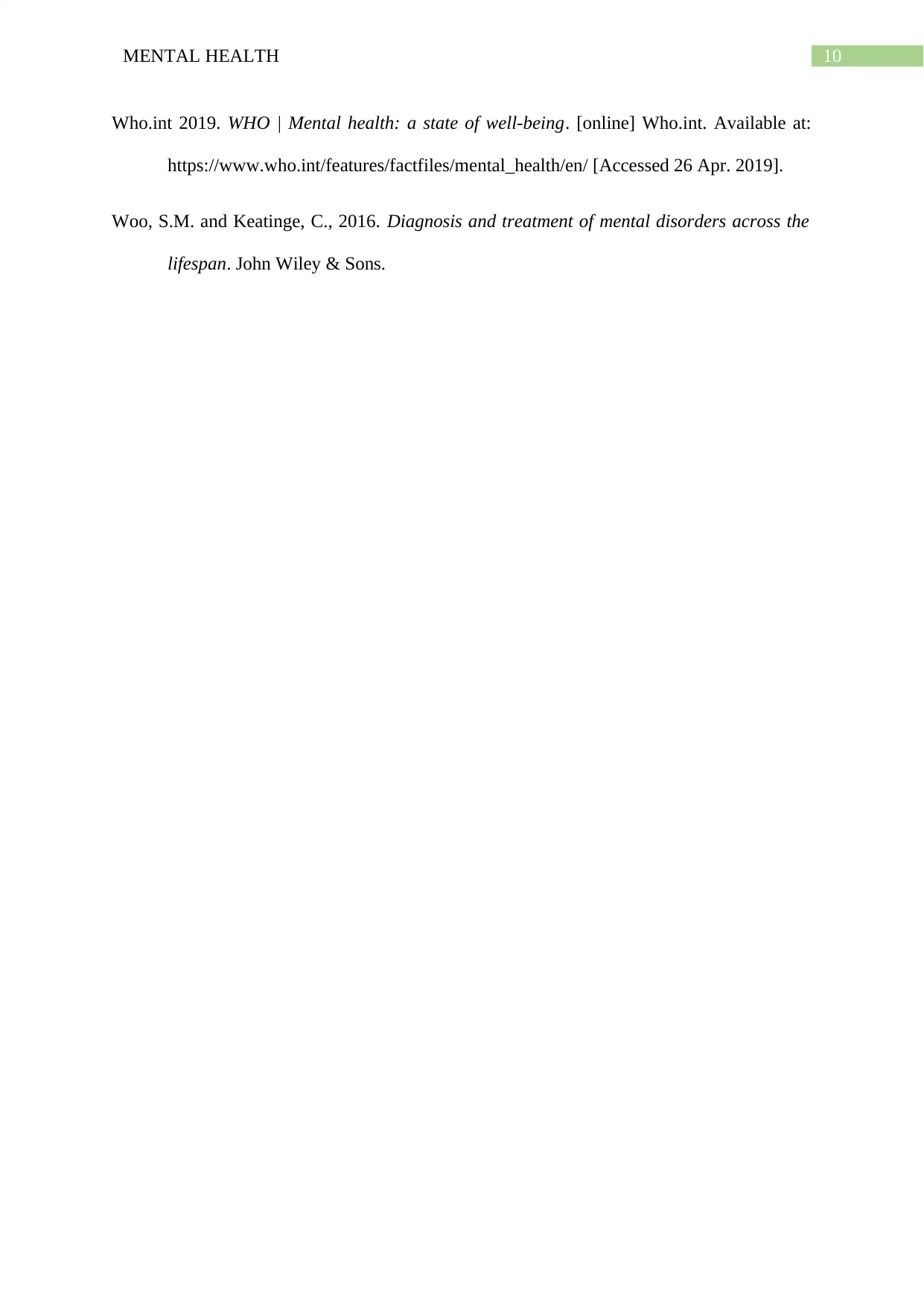
10MENTAL HEALTH
Who.int 2019. WHO | Mental health: a state of well-being. [online] Who.int. Available at:
https://www.who.int/features/factfiles/mental_health/en/ [Accessed 26 Apr. 2019].
Woo, S.M. and Keatinge, C., 2016. Diagnosis and treatment of mental disorders across the
lifespan. John Wiley & Sons.
Who.int 2019. WHO | Mental health: a state of well-being. [online] Who.int. Available at:
https://www.who.int/features/factfiles/mental_health/en/ [Accessed 26 Apr. 2019].
Woo, S.M. and Keatinge, C., 2016. Diagnosis and treatment of mental disorders across the
lifespan. John Wiley & Sons.
1 out of 11
Related Documents
Your All-in-One AI-Powered Toolkit for Academic Success.
+13062052269
info@desklib.com
Available 24*7 on WhatsApp / Email
![[object Object]](/_next/static/media/star-bottom.7253800d.svg)
Unlock your academic potential
Copyright © 2020–2026 A2Z Services. All Rights Reserved. Developed and managed by ZUCOL.





